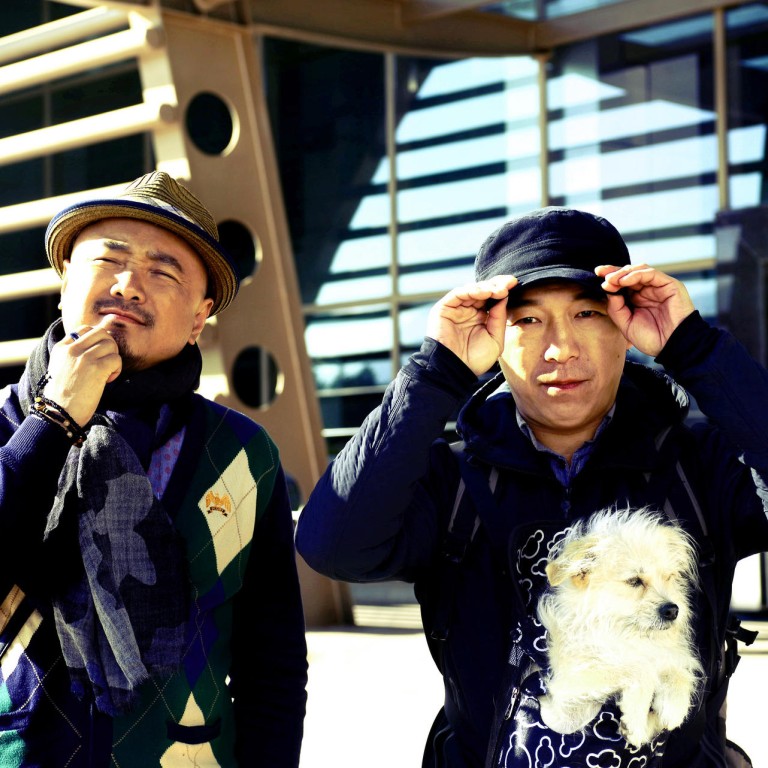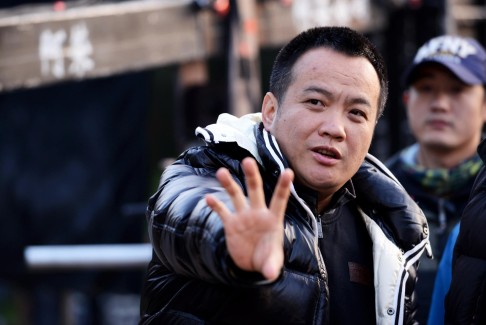
Ning Hao's comedy takes two buddies across changing mainland
Two of the mainland's most successful comedies in recent years were made, separately, by good buddies Xu Zheng and Ning Hao, with Huang Bo and the multi-talented Xu starring in both films.
Directed and co-written by Xu, (2012) became the mainland's all-time top box office grosser with total takings of 1.26 billion yuan (HK$1.59 billion), while Ning's was the box office champ of the recent Golden Week, reaping 579 million yuan in its first six days of release.
Ning has been compared to Judd Apatow, the American director-writer-producer of "brathouse comedies" such as and Both filmmakers send their buddies on wayward adventures while making us like them no matter what they get up to.
Surprisingly, Ning says he has never heard of Apatow when we meet in Toronto, where has its world premiere. "I don't watch many movies, I used to watch more," he admits.
While Ning claims to love the violent mayhem of Quentin Tarantino, John Woo Yu-sum, Park Chan-wook and Bong Joon-ho, he says China has its own tradition of buddy comedies in the Qinqiang operas which originated in the Tang dynasty. "It's a bit like where live actors work off each other. Peking opera said they'd lost the tradition, but it's evolving and changing and is alive. There is a need for comedy in our lives."
The protagonists in are an ill-matched pair, leading to the absurdist humour Ning adores. Geng Hao (Huang) is a sensitive soul dealing with the emotional aftermath of a messy divorce; he would rather still be married. His unlikely best friend, playboy Hao Yi (Xu), is determined to show Geng Hao the ways of the modern world. He suggests they go for a jaunt across the country - and get laid as much as possible.
The idea came from Ning's screenwriter buddy Yue Xiaojun, credited as one of six writers on . "He got divorced and he had revenge on his mind. He had a camera in his car and said to me, 'We can't stay in Beijing'," Ning recalls. They set off on a trip which along the way became a road movie about the rapidly evolving mainland - appropriate given the changing modes of transport and construction of highways all over the country.
"It's almost like you cannot live without a car in China," Ning says. "There's so much transformation and modernisation going on, it's impossible to define. We are being bombarded by American culture, including movies, so I'm choosing this material from the westernised, Americanised part of the Chinese reality."

He even positions the characters as the old-fashioned caring hero versus the self-centred hedonist, and makes Hao Yi a buffoon just in case we don't get his drift. The humour mostly comes as Geng Hao is exposed to an array of colourful characters, although the stereotype of the sophisticated Beijingers versus the simple country folk is tested when the pair are confronted with young counterculture types. "There are many places like this, especially in Yunnan province, in southwestern China, where there are a lot of minorities," Ning says. Like everywhere else the different groups are jostling with each other over their own agendas.
Ning says had no problem getting past the censors. His previous, darker road movie, , was held up for three years before it was finally released on the mainland last December.
So there's an impression that he has taken a more conventional route with his latest outing. But Ning says: "I feel that last year and this year in particular the censorship has suddenly loosened. There are quite a few subjects that before wouldn't have passed but that we were able to explore in ."
[Qinqiang opera] is a bit like Punch and Judy where live actors work off each other
Having worked extensively in television, Ning has the common touch. He first gained recognition with art-house movies such as (2003) - which he made after graduating from the Beijing Film Academy - and road movie (2004), which won a host of international awards. He then made a swift transition to commercial projects with two action comedy hits, (2006) and (2007). Both films shared a frenetic edge and energy.
Ning does not do soft and cute, so even the female characters in are tough. "They are a realistic portrait of the new generation of young Chinese women," the director says. "They are the single children of the one-child policy so they have to have the same kind of responsibility as the single boys. They have to step up to society's demands."
At the Q&A session following ' screening at the Toronto International Film Festival, Ning caused a stir by mentioning the growing phenomenon of the "green tea bitch" - basically ambitious gold-diggers - as an example of how the traditional view of women is changing in China. When I mention this he cackles, chuffed that he has caused a fuss.
Ning admits his male leads aren't cute (another thing he has in common with Apatow) even if they are two of China's most bankable stars. He says Huang is the Chinese answer to Tom Hanks. "He's not handsome, he has a certain look and Chinese people often say he's ugly. He has a lot of character and he's a fantastic actor."
After Toronto, Ning has plans to accompany his buddy Xu, whom he wryly calls "the bald actor", to Hong Kong, where he plans a follow-up to . He also aspires to one day make a blockbuster such as Bong Joon-ho's .
"It's actually an easy time to get money - a lot of Chinese have made money," he says, laughing.
Breakup Buddies
SEVEN TO SEE
Hong Kong Asian Film Festival director Gary Mak Sing-hei recommends seven films screening at the event this year.
This 1931 silent film looks at the inner conflicts of a woman in Shanghai who has to choose between love and reality, a traditional role and a career. Starring Ruan Lingyu and directed by Bu Wancang, this long-unseen work was restored in 2013 by the Chinese Taipei Film Archive.
Ho Yi's film touches on national education in local leftist schools during the Cultural Revolution. It is timely to revisit this part of Hong Kong history when students were brainwashed about capitalism.
A rare look at a contemporary Tibet that is being assimilated into the central Han culture of China. Directed by Tibetan filmmaker Pema Tseden (the director-in-focus this year), this little gem is based on a Tibetan folk tale of a prince who sacrifices everything, from his wealth to his sons, in service of others.
The latest work by mainland director Wang Xiaoshuai appears to be a thriller about an intruder making anonymous phone calls. But it turns out to be a subtle reflection on the Cultural Revolution's impact on relationships, especially family ties.

An 11-year-old girl dreams of owning a bicycle in Saudi Arabia, where women are forbidden to ride bikes. From this scenario, the country's first female director, Haifaa al-Mansour, has made an uplifting coming-of-age story.
This documentary reveals the true story behind the success of Samsung - one that involves people losing their lives while working in harsh conditions at a semiconductor plant.
Mesmerising and observant, Nuri Bilge Ceylan's drama (below), about the divide between rich and poor, unfolds in a series of conversations. The Palme d'Or winner this year is the Turkish filmmaker's third triumph at Cannes

The Hong Kong Asian Film Festival runs from Friday until November 19
Want more articles like this? Follow SCMP Lifestyle on Facebook!

